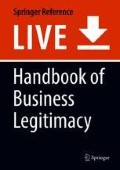Abstract
Formal organizations in modern societies are based on contract relations that facilitate to rationalize organizational behavior according to the central norm of a functional system (economy, politics, law, religion, welfare, family, etc.). Beyond such functional regulations, business legitimacy reflects the social embeddedness of organizations and codifies the cultural norms of the organizational members’ internal and external behavior. Corruption, in common understanding, is a deviant behavior that breaks the fundamental norm of modern societies, that is, undermines the strict separation between the private and the public sphere. Management theory in general treats business legitimacy as means to regulate the relation between organizations and their social environment. On the basis of two empirical case studies two concepts of business legitimacy are distinguished: the classical formal business legitimacy as reactive and the substantial business legitimacy as proactive policy. It will be demonstrated that the understanding of business legitimacy correlates with the idea of management as steering respectively as reflexive management of regulation of self-regulation. Finally, the options in management and business legitimacy are discussed in the context of the paradigmatic shift from domination to governance in the transition from the Fordist to the Flexible Production model (for an overview, see: Thompson, Fordism, post-fordism, and the flexible system of production. Centre for digital discourse and culture. Virginia Polytechnic Institute and State University, Blacksburg, n.d.).
References
Beck U (1992) Risk society. Towards a new modernity. Sage, London
Bell D (1976) The cultural contradictions of capitalism. Basic Books, New York
Berger PL (1991) The capitalist revolution. Fifty propositions about prosperity, equality, and liberty. With a new introduction by the author. Basic Books, New York
Berger PL, Luckmann T (1966) The social construction of reality. A treaties in the sociology of knowledge. Doubleday, New York
Deegan C, Rankin M, Tobin J (2002) An examination of the corporate social and environmental disclosures of BHP from 1983–1997. A test of legitimacy theory. Account Audit Account J 15(3):312–343
Drucker PF (1969) The age of discontinuity. Guidelines to our changing society. Harper & Row, New York
Habermas J (1987) Theory of communicative action. Vol. two: life-world and system. A critique of functionalist reason. Translated by Thomas A. McCarthy. Beacon Press, Boston
Inglehart RF (1977) The silent revolution. Changing values and political styles among Western publics. Princeton University Press, Princeton
Kaplan SE, Ruland RG (1991) Positive theory, rationality and accounting regulation. Crit Perspect Account 2(4):361–374
Kellner H, Heuberger FW (eds) (1992) The hidden technocrats. The new class and new capitalism. Transaction, New Brunswick/London
Kohlberg L (1973) Continuities in childhood and adult moral development revisited. In: Baltes PB, Schaie KW (eds) Life-span development psychology. Academic, New York/London, pp 179–204
Porter ME (2010) How big business can regain legitimacy. Bloomberg Businessweek, May 6, 2010
Rendtorff JD (2009) Responsibility, ethics and legitimacy of corporations. Copenhagen Business School Press, Copenhagen
Schutz A, Luckmann T (1973) The structures of the lifeworld. Northwestern University Press, Evanston
Suchman MC (1995) Managing legitimacy. Strategic and institutional approaches. Acad Manag Rev 20:571–610
Thompson GF (n.d.) Fordism, post-fordism, and the flexible system of production. Centre for digital discourse and culture. Virginia Polytechnic Institute and State University, Blacksburg. https://www.cddc.vt.edu/digitalfordism/fordism_materials/thompson.htm
Warren RC (2003) The evolution of business legitimacy. Eur Bus Rev 15(3):153–163
Author information
Authors and Affiliations
Corresponding author
Editor information
Editors and Affiliations
Rights and permissions
Copyright information
© 2019 Springer Nature Switzerland AG
About this entry
Cite this entry
Tänzler, D. (2019). Corruption, Norms, and Business Legitimacy. In: Rendtorff, J. (eds) Handbook of Business Legitimacy. Springer, Cham. https://doi.org/10.1007/978-3-319-68845-9_46-1
Download citation
DOI: https://doi.org/10.1007/978-3-319-68845-9_46-1
Received:
Accepted:
Published:
Publisher Name: Springer, Cham
Print ISBN: 978-3-319-68845-9
Online ISBN: 978-3-319-68845-9
eBook Packages: Springer Reference Religion and PhilosophyReference Module Humanities and Social SciencesReference Module Humanities

